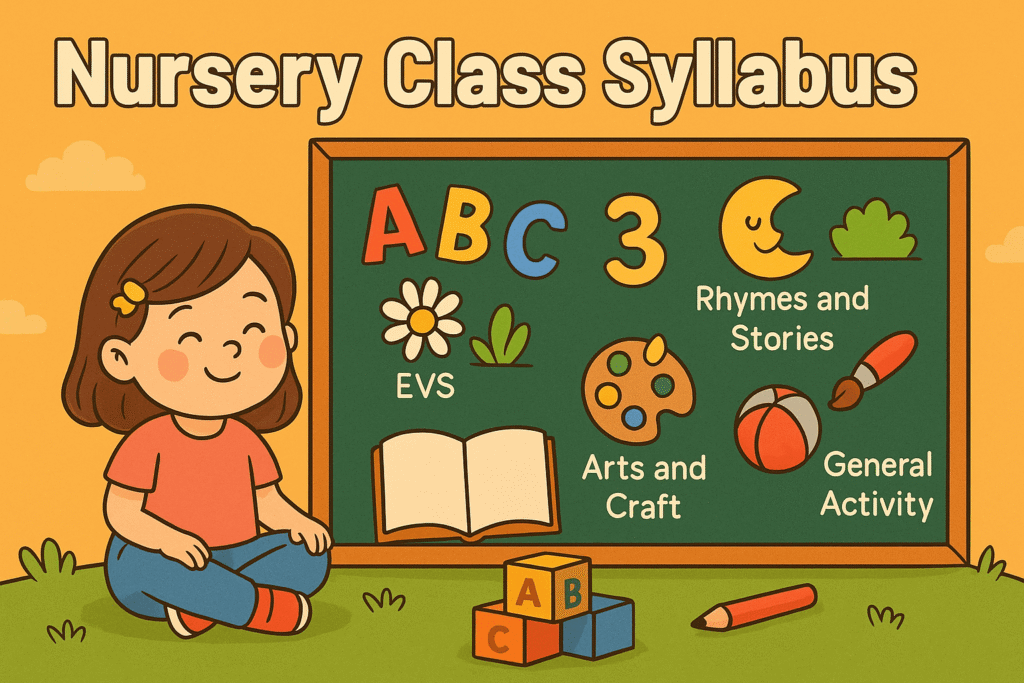Explore the detailed CBSE nursery class syllabus for 2025. Learn about English, Maths, EVS, rhymes, arts, crafts, and general activities designed to nurture holistic development in young learners. Download syllabus PDF and FAQs included.

Nursery Class Syllabus 2025
The Central Board of Secondary Education (CBSE) in India is known for its comprehensive and well-structured educational framework. This approach extends thoughtfully to early childhood education as well. The CBSE nursery syllabus reflects this commitment, aiming to lay a strong foundation for young learners. This article explores the nursery class syllabus under the CBSE board, detailing its components and explaining how it shapes the educational journey of preschoolers.
Overview of CBSE Nursery Class Syllabus
The CBSE nursery syllabus is designed with a child-centered approach, focusing on nurturing the intellectual, physical, emotional, and social development of children aged 3 to 4 years. This curriculum is not limited to academics; it integrates various activities aimed at developing essential skills and introducing basic concepts appropriate for this age group.
It is a comprehensive framework that includes subjects and activities designed to engage and stimulate young minds. Below, we discuss the main subjects covered in nursery classes — English, Maths, Environmental Studies (EVS), along with creative and general activities that are part of this early education stage.
Nursery Class English Syllabus
Oral Topics
The oral component of the English syllabus focuses on language development through listening and speaking skills. It includes:
- Basic phonetics: Understanding and correctly pronouncing alphabets.
- Vocabulary building: Introduction to simple words and their meanings.
- Everyday conversations: Greetings, self-introduction, and simple dialogues.
- Listening to stories and poems: Developing comprehension and analytical skills.
Written Topics
The written aspect includes:
- Introduction to alphabets: Recognizing and writing alphabets.
- Basic word formation: Joining letters to form simple words.
- Writing one’s name and familiar words.
- Simple drawing and coloring activities that relate to letters and words.
Practical Topics
Practical activities in English involve:
- Picture reading: Describing scenes or objects.
- Role-playing: Enacting simple dialogues or story scenes.
- Interactive games: Language-based games to enhance vocabulary and sentence formation.
Nursery Class Maths Syllabus
Oral Topics
Oral mathematics activities include:
- Counting numbers: Learning to count objects and understand number sequences.
- Basic shapes and colors: Identifying and naming common shapes and colors.
- Simple comparisons: Understanding concepts like big/small, more/less, etc.
Written Topics
Written tasks involve:
- Writing numbers: Recognizing and writing numbers.
- Basic exercises: Simple worksheets involving counting and matching numbers with objects.
- Coloring shapes and patterns: Improving recognition of shapes and patterns.
Practical Topics
Practical maths activities include:
- Counting with objects: Using real-life objects to count and perform basic arithmetic.
- Shape sorting games: Identifying and sorting shapes.
- Measurement activities: Using non-standard units (like blocks) for measuring objects.
Nursery Class EVS Syllabus (Environmental Studies)
General Topics
General EVS topics include:
- Myself and my family: Understanding oneself and family relationships.
- Plants and animals: Basic recognition of common plants and animals.
- My home and neighborhood: Learning about different rooms in a house and nearby places.
Practical Topics
Practical activities include:
- Nature walks: Observing the environment and collecting natural materials.
- Simple experiments: Exploring natural phenomena through safe and guided activities.
- Sorting and classifying: Grouping objects based on different characteristics.
Nursery Class Rhymes and Stories Syllabus
Rhymes and stories are essential parts of the nursery syllabus. They aim to:
- Enhance language skills and vocabulary.
- Stimulate imagination and creativity.
- Teach moral values and ethics.
- Engage children with rhythm and music through rhymes.
Nursery Class Arts and Craft Syllabus
Arts and craft activities help to:
- Develop fine motor skills.
- Foster creativity and self-expression.
- Introduce basic concepts of colors, shapes, and textures.
- Encourage exploration and experimentation with various materials.
Nursery Class General Activities Syllabus
General activities in nursery include:
- Physical education: Simple exercises and games to promote fitness and coordination.
- Social skills development: Group activities, sharing, and cooperative play to build social interaction skills.
- Sensory activities: Exercises involving touch, smell, taste, sight, and hearing to improve sensory awareness.
Nursery Class Syllabus PDF
Many schools provide the nursery syllabus in PDF format for easy access by parents and teachers. These PDFs include detailed lesson plans, activity ideas, and assessment methods to help guide the learning process at home and school.
Frequently Asked Questions (FAQs)
-
What is the syllabus of nursery class?
The nursery syllabus is a structured set of learning activities designed to support the holistic development of children aged 3 to 4 years. It includes basic concepts in English, Maths, EVS, arts, crafts, rhymes, stories, and general activities to foster intellectual and social growth.
-
How to make a syllabus for nursery class?
A nursery syllabus is created by focusing on age-appropriate developmental milestones. It should include language development, numerical ability, environmental awareness, creative activities, and physical development. Activities should be fun, interactive, and nurturing.
-
What is the syllabus for nursery class?
The nursery syllabus typically covers foundational topics in English (alphabets and speaking), Maths (numbers and shapes), Environmental Studies (family, plants, animals), Rhymes and Stories for language and creativity, Arts and Crafts for fine motor skills, and General Activities for overall development.
-
What is the syllabus of nursery class under CBSE?
CBSE’s nursery syllabus emphasizes a child-centric approach with activities that nurture all-round development—intellectual, physical, emotional, and social. It includes English language skills, basic maths concepts, environmental awareness, creative arts, physical education, and social skills.
Conclusion
The CBSE nursery syllabus is thoughtfully designed to nurture young children holistically, helping them build a strong foundation for future learning. With its focus on interactive, playful, and practical activities, it ensures that children enjoy their first steps in education while developing essential skills. Parents and teachers can use this syllabus to guide their little learners effectively and make early childhood education a joyful and fruitful experience.
1 thought on “Nursery Class Syllabus 2025-26 | CBSE English, Maths, EVS & Activities”